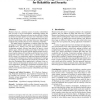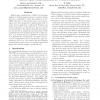1511 search results - page 1 / 303 » On the effectiveness of address-space randomization |
ACSAC
2006
IEEE
13 years 11 months ago
2006
IEEE
Address space randomization is an emerging and promising method for stopping a broad range of memory corruption attacks. By randomly shifting critical memory regions at process in...
ASPLOS
2008
ACM
13 years 7 months ago
2008
ACM
Memory errors are a notorious source of security vulnerabilities that can lead to service interruptions, information leakage and unauthorized access. Because such errors are also ...
CN
2007
13 years 5 months ago
2007
Worms are self-replicating malicious programs that represent a major security threat for the Internet, as they can infect and damage a large number of vulnerable hosts at timescal...
ACSAC
2006
IEEE
13 years 11 months ago
2006
IEEE
Address-space randomization (ASR) is a promising solution to defend against memory corruption attacks that have contributed to about three-quarters of USCERT advisories in the pas...
ICS
2004
Tsinghua U.
13 years 11 months ago
2004
Tsinghua U.
The Cray X1 was recently introduced as the first in a new line of parallel systems to combine high-bandwidth vector processing with an MPP system architecture. Alongside capabili...


